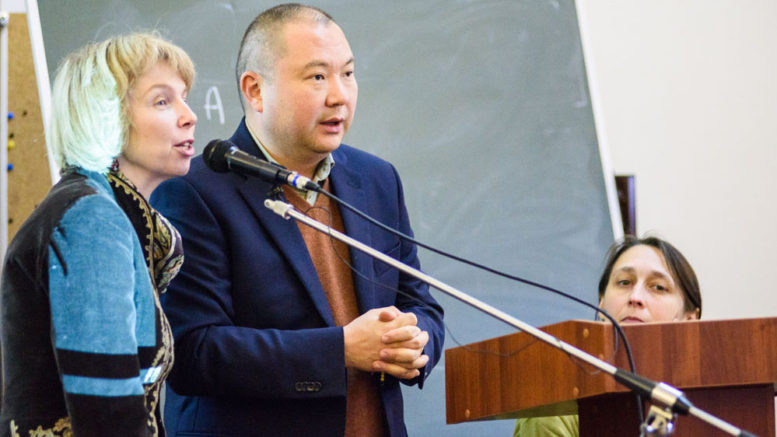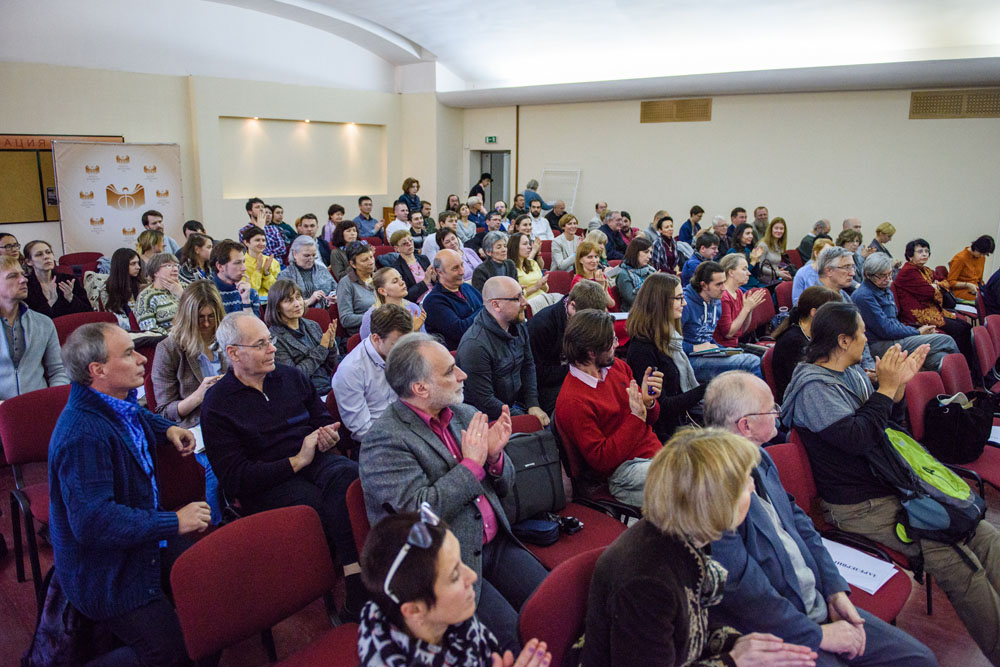Moscow: The Institute of Philosophy in Moscow was a scene of a roundtable discussion “Buddhism and Science” which gave prominent Russian scientists a chance to share their impressions of the first dialogue with His Holiness the Dalai Lama and Buddhist monks-scholars held in Delhi in August.
Opening the roundtable discussion Telo Tulku Rinpoche, His Holiness the Dalai Lama’s representative in Russia, Mongolia and CIS countries called the conference in Delhi organized by Moscow Tibet Office, Save Tibet Foundation with the support of Center for Consciousness Studies operating under the Moscow State University “a breaking moment for all of us who participated”.
Though there is nothing new in the dialogue between Western scientists and Buddhist scholars which has been successfully held for 30+ years, it is for the first time that it involved Russian scientists, he noted.
According to Telo Tulku Rinpoche, «the conference “Fundamental Knowledge: Dialogues between Russian and Buddhist Scholars” in Delhi have opened up a lot of doors, a lot of opportunities for the development of mind, understanding and communication». He stressed that the common goal for the both sides was “to help humanity to improve”.
Leading neuroscientist prof. Konstantin Anokhin, corresponding member of the Russian Academy of Sciences, said that the main motivation of the participants was to present His Holiness specific approaches of Russian brain science, psychology, linguistics and philosophy that may differ from those found in Western analytical neuroscience, analytical philosophy and psychology.
“Though Russia is a European country sharing European scientific approaches, it has other kinds of mentality that make Russian approaches to science different from strictly Western ones”, he said adding that it may suggest a better understanding of certain questions that have been investigated by Buddhists throughout the centuries.
Prof. Konstantin Anokhin noted that the Russian participants were astonished by the level of knowledge of Buddhist monks who attended “Emory-Tibet” study programs and were recommended for the conference by Geshe Lhakdor, Director of Tibetan Works and Archives. “They’ve had excellent expertise not only in their own field that we don’t know much about, but also in our professional fields such as neuroscience and psychology. That was very impressive”, he said.
Prof. Anokhin and other presenters also spoke highly of preliminarily lectures by invited Buddhist scholars organized by Telo Tulku Rinpoche to help Russian scientists to have better understanding of Buddhist science before entering into the dialogue with His Holiness the Dalai lama. Buddhist presenters – Venerable Geshe Lhakdor, Director of the Library of Tibetan Works and Archives (he spoke on Emory-Tibet Initiative), Venerable Geshe Dorje Damdul, Director of Tibet House, Delhi (“Objective understanding of mind and mental factors”), Venerable Barry Kerzin, Director of Altruism in Medicine (“Scientific studies of meditation”), Venerable Tenzin Priyadarshi, Director of the Dalai Lama Center of Ethics and Transformative Values at MIT (“ReImagining Ethics: Humans and AI”) – not only gave important presentations but also participated in discussions helping Russian scientists to penetrate deeper into certain Buddhist ideas.
Neurolinguist prof. Tatiana Chernigovskaya, corresponding member of the Russian Academy of Sciences, said she was impressed by the openness of Buddhism and its readiness to reconsider certain positions should they prove to be mistaken by new scientific data. “Most of religions I know about would never make such a step or would make it in a very reserved manner”.
Prof. Tatiana Chernigovskaya said she had watched many hours of “Mind and Life” programs involving discussions with neuroscientists, philosophers, quantum physics and biologists in preparation for the conference. “It requires quite a courage from the Buddhist side to come to listen and discuss such a wide range of topics”, she said.
The acclaimed Russian scholar said she came to His Holiness and his colleagues “to study from them”.
“For quite some time Buddhists have been dealing with the problems that science has just started to approach. Many well-trained minds have been investigating them, century after century so we need to go there and ask questions”, she mentioned.
Cognitive psychologist Prof. Maria Falikman (Moscow State University) said she is very interested in people who dedicated their lives to Buddhist practice. “Cooperation with them could help us to move forward in our understanding of brain and psychological mechanisms of cognition as Buddhist practices restructure brain functions and change psychic processes which was already shown by multiple researches”, she said.
She was particularly surprised by the personal involvement of His Holiness the Dalai Lama. “His interest, personal involvement, unexpected turns of conversations and his sharp retorts were very surprising, they helped tremendously to get a fuller picture of what was going on”, Prof. Maria Falikman mentioned.
It was an important experience for her to see how being a highly recognized spiritual leader His Holiness the Dalai Lama still has a vital interest in questions of the nature of consciousness discussed during the dialogues.
Philosopher Prof. David Dubrovski (Institute of Philosophy, Russian Academy of Sciences) said that conversations with His Holiness gave him a lot of joy and the whole atmosphere at the conference was full of openness, sincerity, love and respect to each other.
“The experience of communication with Buddhists was important for us existentially, he said, it motivated us to study and master one’s own consciousness and to get a better understanding of it”.
According Prof. Victoria Lysenko (Institute of Philosophy, Russian Academy of Sciences), “consciousness is a key problem for our way of thinking and behaviour. It is very important to understand who we are. And in this sense, ideas of various cultural traditions who have not only been studying consciousness but also cultivating it as part of their spiritual practices are extremely important and useful.”
Prof. Victoria Lysenko who was one of the key people bringing together Russian scholars interested in having dialogue with His Holiness the Dalai Lama suggested to rely upon Buddhist theories in an attempt to understand what consciousness is. “Buddhists have been studying consciousness and experimenting with it. We have both an experiment and a theory here and we may now try to verify how true their theories are scientifically. But in order to do it one should know Buddhism”, she said.
Prof. Victoria Lysenko expressed hope that the conference in Delhi will help Russian philosophers to leave their small comfortable world where they might feel self-important and see what is going on outside. “Once you go outside, you will definitely come across new approaches, as well as deeper understanding of certain things. It enriches your own self-understanding tremendously”, she said.
Prof. Yuri Alexandrov, corresponding member of the Russian Academy of Sciences, whose video message was shown at the roundtable was pleased that his idea that the differences between people of various nationalities should be celebrated was understood and appreciated by the Buddhist participants.
“There is nothing bad in difference between people, it is something that needs to be celebrated as it provides you with a new additional point of view that could be complimentary to your own. If we want to describe the reality we can only do it together”.
Report filed by Office of Tibet, Moscow

Prof. Tatiana Chernigovskaya is speaking at the roundtable discussion “Buddhism and Science”. Institute of Philosophy, Russian Academy of Sciences, Moscow. (Photo by Renat Alyaudinov)


